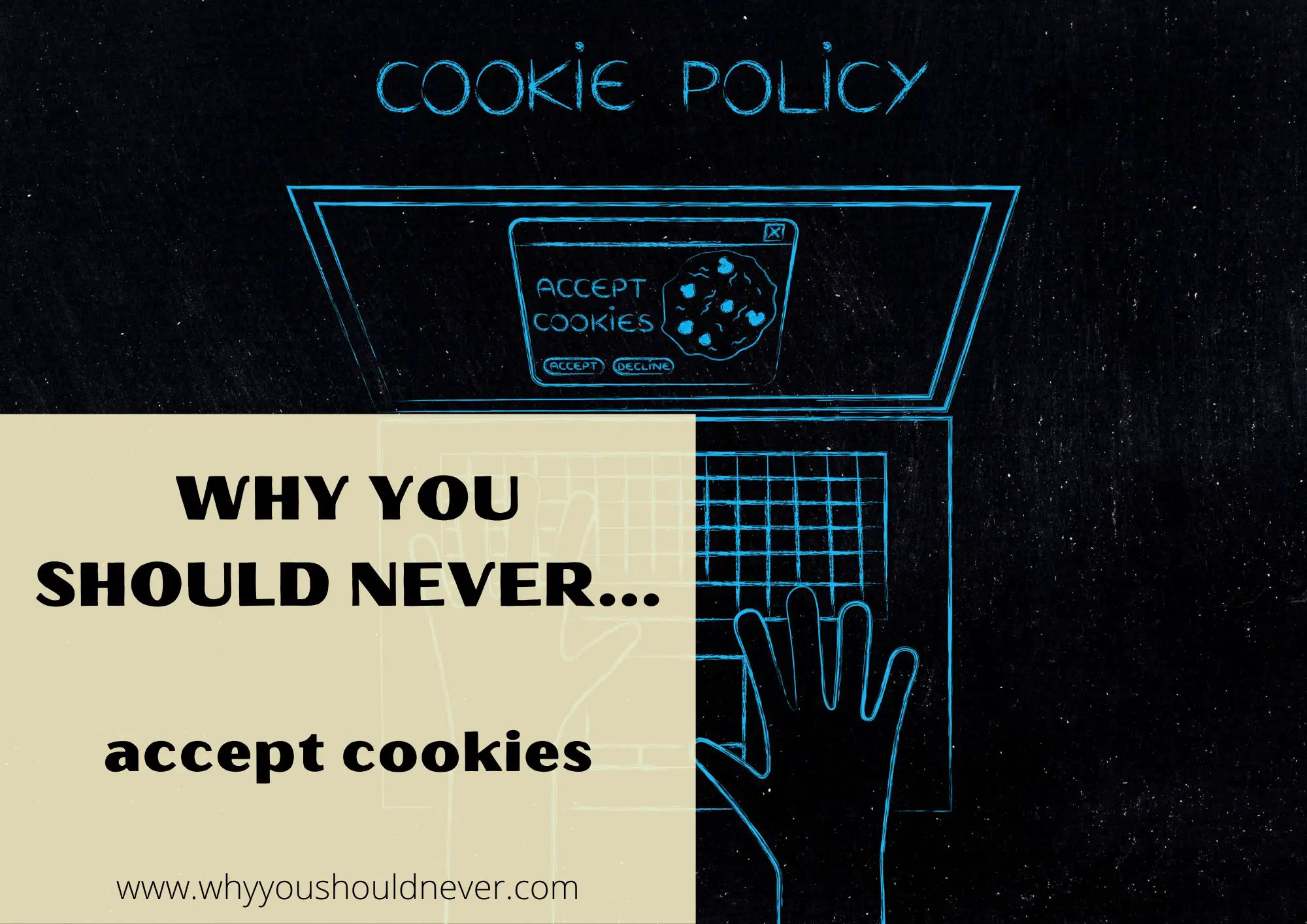![]()
Why You Should Never Accept Cookies
Now, this isn’t a lecture about the evils of sugar or an intervention on your late-night snacking habits. Rather, it’s about those innocuous little pop-ups that greet us on virtually every website we visit, politely asking us to ‘accept cookies.’
For the uninitiated, ‘cookies’ in internet lingo are tiny files that websites place on our devices to remember our behaviors, preferences, and other data that helps them deliver a personalized web experience. They’re the reason your Amazon homepage is filled with things you might actually want to buy, or how YouTube seems to know just the right video to keep you hooked.
Convenient, right? Well, hold on to your hats, because there are quite a few reasons why you might want to think twice before accepting those sweet digital treats.
11 reasons why you shouldn’t accept cookies
1. Privacy? What privacy?
Cookies have a knack for tracking your online behavior and storing your data, including personal information, browsing history, and even your location. Although most cookies are harmless and only used to improve your browsing experience, some of them can be intrusive, collecting data about your internet habits for targeted advertising.
Essentially, they’re like that overly observant neighbor who always knows a bit too much about your life.
2. Your data becomes a marketer’s dream
With cookies enabled, your data becomes an open book to marketers. They use this information to curate targeted ads that match your browsing habits and interests.
While it may seem convenient to have ads tailored to your preferences, it also means that marketers are constantly monitoring your online behavior. This can sometimes feel like walking into a store where the salespeople know your entire shopping history. Talk about personalized service.
3. Security concerns
The potential for misuse of data is another big reason to be cautious about accepting cookies. While reputable websites usually take steps to secure the data they gather, there’s no foolproof way to protect against all breaches or hacks. A hacker gaining access to your cookie data could have serious implications for your privacy and security.
4. Slower browsing speeds
When you visit a website, your device needs to download all cookies associated with that site. Although individual cookies are quite small, if you visit lots of different sites, these can accumulate and begin to take up considerable space, potentially slowing down your browsing speeds.
5. They can affect your bandwidth
Not only do cookies take up space on your device, but they also consume internet bandwidth. Every time you load a web page, the cookies associated with that site are also loaded, which can increase the amount of data your device uses.
6. The ‘Echo Chamber’ Effect
Cookies facilitate a phenomenon known as the ‘filter bubble’ or ‘echo chamber.’ This is where the personalization created by cookies results in you only seeing information that aligns with your existing views or interests.
Yes, this certainly does have its benefits, but it can also limit exposure to new ideas and perspectives, and can distort your perception of reality.
7. Dependency on third-party cookies
A significant number of cookies aren’t from the site you’re visiting at all; they’re third-party cookies, usually from advertisers. These can track your activity across multiple sites, building a more complete profile of your online habits.
There’s a growing call in many circles to block these third-party cookies due to their implications on privacy.
8. Inaccurate personalization
Cookies often play a vital role in personalizing your experience on a website, based on your browsing history and preferences. However, this can sometimes backfire. If you share your device with others or your browsing habits change, the personalized experience can become more of a nuisance.
You might start seeing product recommendations that no longer align with your interests or news articles on topics you’re no longer interested in, all because the cookies are referencing outdated information.
9. Exposure of sensitive browsing history
We all have certain aspects of our online life that we would prefer to keep private. Cookies, however, can sometimes make that difficult.
Let’s say you’ve been doing some online shopping for a surprise birthday gift. If another user accesses the same website on your device, the cookies stored from your previous session may present them with product recommendations based on your browsing. Suddenly, your surprise isn’t so surprising.
This potential for exposure of sensitive or personal browsing information could get you into a lot of trouble, depending on the situation.
10. Potential for Cross-Site Scripting (XSS) attacks
While it’s relatively rare, cookies can be exploited in what are known as Cross-Site Scripting or XSS attacks. In an XSS attack, malicious scripts are injected into trusted websites, which can then be used to access cookie data and potentially steal sensitive information.
11. Decreased device performance
As mentioned earlier, cookies take up storage space on your device. If you’re dealing with an older device, or one with limited storage, those bits and bytes can add up. Over time, you may notice a decrease in device performance due to the accumulation of cookies.
Wrapping things up
Hmm, those seemingly innocent cookies are a little more complicated than they look, aren’t they?
Like a tale right out of Hansel and Gretel, these digital breadcrumbs might lead you down a path filled with targeted ads, privacy concerns, and unexpected gift spoilers. However, just like in the fairy tale, with a little caution and cunning, you can navigate your way through this digital forest.
Remember, while cookies aren’t inherently malevolent (they’re more like a friendly giant who doesn’t know his own strength), it’s always wise to understand what you’re getting into before you accept that warm plate of pixelated pastries.
After all, in the online world, be mindful that if you’re not paying for a product, you’re often the product! And isn’t that a thought that takes the ‘sweet’ right out of ‘cookies’?
